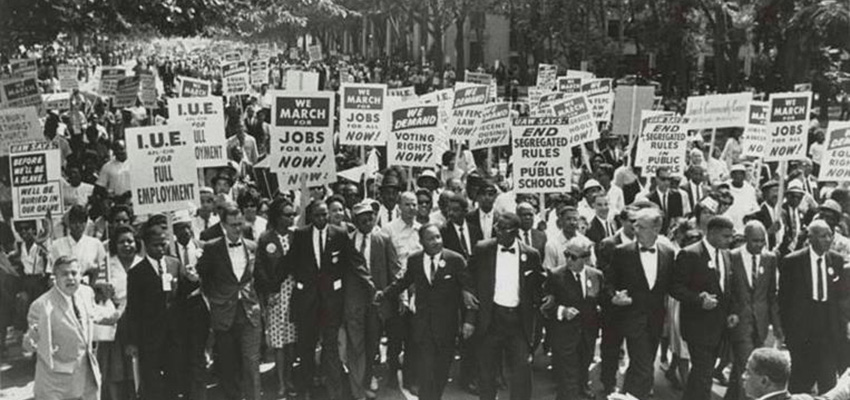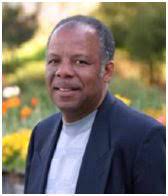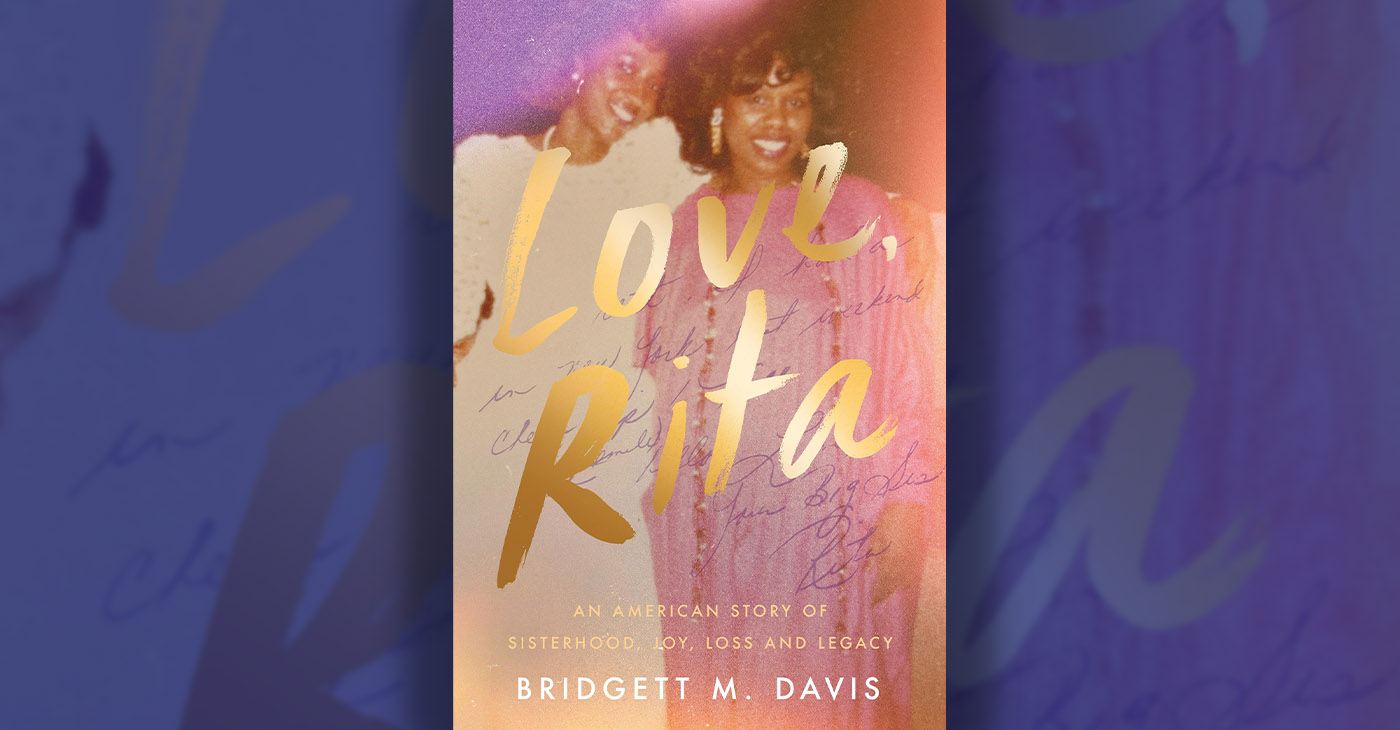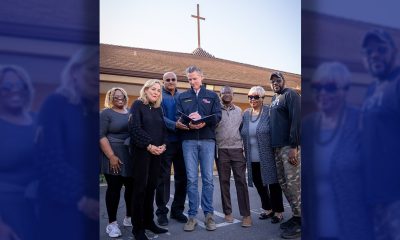Black History
Lee Cherry, Engineer and Advocate for African Americans in Science, Dies at 76
He loved to travel, read, promote science, technology and the environment, highlighting the accomplishments of African Americans in this country and throughout the African Diaspora.


Lee Cherry
Oakland native Lee Cherry, a dedicated scientist, engineer and advocate for science education among African American youth and an active leader in the Black Freedom Movement in his youth, passed away on July 24, 2021. He was 76.
As a young teenager, Cherry was greatly influenced and involved in the Black Freedom movement. He became involved with his older brothers in the Afro-American Association, which was influential in Oakland during the early 1960s before the start of the Black Panther Party when the struggle for racial justice was evolving from the Civil Rights Movement to the rise of Black Power.
The Afro-American Association brought leaders like Malcolm X and Muhammad Ali to the East Bay for public discussions of philosophy, religion, economics, politics and other issues. Members and associates of this group – Ron Dellums, Judge Thelton Henderson, and Cedric Robinson – became some of the most influential cultural and political Black leaders of their generation.
Cherry organized Dignity Institute of Technology in 1967, which was later renamed the African Scientific Institute (ASI) in 1975. The ASI, which is on the web at https://sci-tech.squarespace.com/, is a network of scientists and technologists who participate in their communities. The organization is particularly interested in addressing the problems of developing countries, with special emphasis on capacity building, offering a forum for the exchange of technical information and expertise.
Historically, ASI concerned itself primarily with mentorship programs for minorities entering the field of science, technology, engineering, and mathematics (STEM). Over the years, the organization expanded its objectives to become project-development oriented.
The fourth of 11 children born to Knorvel Sr. and Lucy Cherry, Lee Cherry attended Clausen Elementary School, Oakland Middle School (now Oakland International HS) and graduated from Oakland Technical High School. He attended UC Berkeley and graduated from San Jose State University. Working as an electrical and environmental engineer, he had a professional career that spanned IBM, Lockheed Aerospace, PG&E, and the Department of Defense. He managed electrical defense contracts for the U.S. Navy.
Cherry met and married Lauran Michelle Waters of Wash., DC. The couple has two daughters, Dr. Aminah Cherry and Dr. Jamilah Cherry-Woodard.
He loved to travel, read, promote science, technology and the environment, highlighting the accomplishments of African Americans in this country and throughout the African Diaspora.
He was a dedicated researcher, which enabled him to converse with anyone on multiple subjects. If he didn’t know the subject matter, he would thoroughly research the topic so he could engage. He had an insatiable love for learning.
Lee Cherry leaves to mourn his passing his wife, Lauran Michelle; daughters Dr. Aminah Cherry, Dr. Jamilah Cherry (Terrell); brothers and sisters Loye, James (Cynthia), Bernice, Betty, LaVance and Louis; mother-in-law Faye Waters; uncle Al; grandchild Amari Woodard; nieces Chaleda/Corey, Aleiya, Baniah and many more nieces, nephews, cousins, friends and colleagues.
The Oakland Post’s coverage of local news in Alameda County is supported by the Ethnic Media Sustainability Initiative, a program created by California Black Media and Ethnic Media Services to support community newspapers across California.
Activism
Four Bills Focus on Financial Compensation for Descendants of Enslaved People
This week, CBM examines four more bills in the package — each offering ways for Black Californians to receive restitution for past injustices — from housing assistance and reclamation of loss property to fairer pay and the establishment of a state agency charged with determining eligibility for reparations.

Edward Henderson
California Black Media
Last week, California Black Media (CBM) provided an update on four bills in the California Legislative Black Caucus (CLBC) 2025 Road to Repair package.
The 16 bills in the Black Caucus’s 2025 “Road to Repair” package focus on “repairing the generational harms caused by the cruel treatment of African American slaves in the United States and decades of systemic deprivation and injustice inflicted upon Black Californians,” said the CLBC in a release.
This week, CBM examines four more bills in the package — each offering ways for Black Californians to receive restitution for past injustices — from housing assistance and reclamation of lost property to fairer pay and the establishment of a state agency charged with determining eligibility for reparations.
Here are summaries of these bills, information about their authors, and updates on how far each one has advanced in the legislative process.
Assembly Bill (AB) 57
AB 57, introduced by Assemblymember Tina McKinnor (D-Inglewood), would require that at least 10% of the monies in the state’s home purchase assistance fund be made available to applicants who meet the requirements for a loan under the home purchase assistance program and are descendants of formerly enslaved people.
The Assembly Judiciary Committee is currently reviewing the legislation.
Assembly Bill (AB) 62
AB 62, also introduced by McKinnor, would require the Office of Legal Affairs to review, investigate, and make specific determinations regarding applications from people who claim they are the dispossessed owners of property seized from them because of racially motivated eminent domain. The bill would define “racially motivated eminent domain” to mean when the state acquires private property for public use and does not provide just compensation to the owner, due in whole or in part, to the owner’s race.
AB 62 is currently under review in the Judiciary Committee.
Senate Bill (SB) 464
SB 464, introduced by Sen. Lola Smallwood-Cuevas (D-Los Angeles), aims to strengthen the existing civil rights laws in California concerning employer pay data reporting. The bill mandates that private employers with 100 or more employees submit annual pay data reports to the Civil Rights Department. These reports must include detailed demographic information — including race, ethnicity, sex, and sexual orientation — pertaining to their workforce distribution and compensation across different job categories. Furthermore, beginning in 2027, public employers will also be required to comply with these reporting requirements.
The Senate Committee on Labor, Public Employment, and Rules is currently reviewing SB 464. A hearing is expected to be held on April 23.
Senate Bill (SB) 518
SB 518, introduced by Sen. Akilah Weber Pierson (D-San Diego), establishes the Bureau for Descendants of American Slavery to address and remedy the lasting harms of slavery and the Jim Crow laws suffered by Black Californians.
SB 518 is under review in the Senate Judiciary Committee. A hearing is expected to be held on April 22.
Arts and Culture
BOOK REVIEW: Love, Rita: An American Story of Sisterhood, Joy, Loss, and Legacy
When Bridgett M. Davis was in college, her sister Rita was diagnosed with lupus, a disease of the immune system that often left her constantly tired and sore. Davis was a bit unfazed, but sympathetic to Rita’s suffering and also annoyed that the disease sometimes came between them. By that time, they needed one another more than ever.

By Terri Schlichenmeyer
Author: Bridgett M. Davis, c.2025, Harper, $29.99, 367 Pages
Take care.
Do it because you want to stay well, upright, and away from illness. Eat right, swallow your vitamins and hydrate, keep good habits and hygiene, and cross your fingers. Take care as much as you can because, as in the new book, “Love, Rita” by Bridgett M. Davis, your well-being is sometimes out of your hands.
It was a family story told often: when Davis was born, her sister, Rita, then four years old, stormed up to her crying newborn sibling and said, ‘Shut your … mouth!’
Rita, says Davis, didn’t want a little sister then. She already had two big sisters and a neighbor who was somewhat of a “sister,” and this baby was an irritation. As Davis grew, the feeling was mutual, although she always knew that Rita loved her.
Over the years, the sisters tried many times not to fight — on their own and at the urging of their mother — and though division was ever present, it eased when Rita went to college. Davis was still in high school then, and she admired her big sister.
She eagerly devoured frequent letters sent to her in the mail, signed, “Love, Rita.”
When Davis was in college herself, Rita was diagnosed with lupus, a disease of the immune system that often left her constantly tired and sore. Davis was a bit unfazed, but sympathetic to Rita’s suffering and also annoyed that the disease sometimes came between them. By that time, they needed one another more than ever.
First, they lost their father. Drugs then invaded the family and addiction stole two siblings. A sister and a young nephew were murdered in a domestic violence incident. Their mother was devastated; Rita’s lupus was an “added weight of her sorrow.”
After their mother died of colon cancer, Rita’s lupus took a turn for the worse.
“Did she even stand a chance?” Davis wrote in her journal.
“It just didn’t seem possible that she, someone so full of life, could die.”
Let’s start here: once you get past the prologue in “Love, Rita,” you may lose interest. Maybe.
Most of the stories that author Bridgett M. Davis shares are mildly interesting, nothing rare, mostly commonplace tales of growing up in the 1960s and ’70s with a sibling. There are a lot of these kinds of stories, and they tend to generally melt together. After about fifty pages of them, you might start to think about putting the book aside.
But don’t. Not quite yet.
In between those everyday tales, Davis occasionally writes about being an ailing Black woman in America, the incorrect assumptions made by doctors, the history of medical treatment for Black people (women in particular), attitudes, and mythologies. Those passages are now and then, interspersed, but worth scanning for.
This book is perhaps best for anyone with the patience for a slow-paced memoir, or anyone who loves a Black woman who’s ill or might be ill someday. If that’s you and you can read between the lines, then “Love, Rita” is a book to take in carefully.
Activism
Faces Around the Bay: Author Karen Lewis Took the ‘Detour to Straight Street’
“My life has been a roller-coaster with an unlimited ride wristband! I was raised in Berkeley during the time of Ron Dellums, the Black Panthers, and People’s Park. I was a Hippie kid, my Auntie cut off all our hair so we could wear the natural styles like her and Angela Davis.

By Barbara Fluhrer
I met Karen Lewis on a park bench in Berkeley. She wrote her story on the spot.
“My life has been a roller-coaster with an unlimited ride wristband! I was raised in Berkeley during the time of Ron Dellums, the Black Panthers, and People’s Park. I was a Hippie kid, my Auntie cut off all our hair so we could wear the natural styles like her and Angela Davis.
I got married young, then ended up getting divorced, raising two boys into men. After my divorce, I had a stroke that left me blind and paralyzed. I was homeless, lost in a fog with blurred vision.
Jesus healed me! I now have two beautiful grandkids. At 61, this age and this stage, I am finally free indeed. Our Lord Jesus Christ saved my soul. I now know how to be still. I lay at his feet. I surrender and just rest. My life and every step on my path have already been ordered. So, I have learned in this life…it’s nice to be nice. No stressing, just blessings. Pray for the best and deal with the rest.
Nobody is perfect, so forgive quickly and love easily!”
Lewis’ book “Detour to Straight Street” is available on Amazon.
-

 Activism4 weeks ago
Activism4 weeks agoOakland Post Endorses Barbara Lee
-

 Activism4 weeks ago
Activism4 weeks agoOakland Post: Week of April 2 – 8, 2025
-

 #NNPA BlackPress3 weeks ago
#NNPA BlackPress3 weeks agoTrump Profits, Black America Pays the Price
-

 Activism2 weeks ago
Activism2 weeks agoOakland Post: Week of April 9 – 15, 2025
-

 #NNPA BlackPress3 weeks ago
#NNPA BlackPress3 weeks agoHarriet Tubman Scrubbed; DEI Dismantled
-

 #NNPA BlackPress3 weeks ago
#NNPA BlackPress3 weeks agoTrump Targets a Slavery Removal from the National Museum of African-American History and Culture
-

 #NNPA BlackPress3 weeks ago
#NNPA BlackPress3 weeks agoNew York Stands Firm Against Trump Administration’s Order to Abandon Diversity in Schools
-

 #NNPA BlackPress3 weeks ago
#NNPA BlackPress3 weeks agoLawmakers Greenlight Reparations Study for Descendants of Enslaved Marylanders



















































